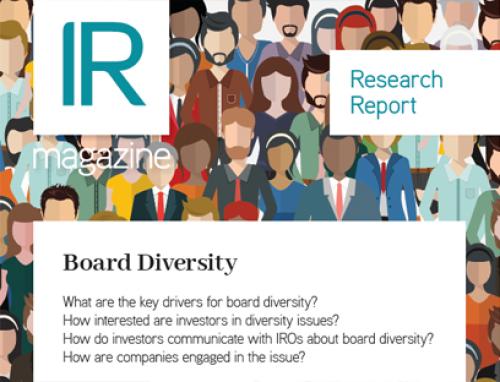UK teams to hire more in-house corporate access while capital markets professionals turn to IR for career change, reveals EMR's latest IR talent survey
The ambience was cheerful at the roundtable held last week by London-based recruitment agency EMR to discuss the findings from its latest UK IR salary survey, the last of which was conducted in 2012.
‘The first thing that strikes me is the clear improvement in market confidence,’ enthused Anastasia Pittas, a senior consultant. ‘That’s not only due to the fact that 66 percent of IROs report a salary increase. Half of respondents say they are optimistic about the future of the UK economy – that’s 30 percent more than three years ago.’
Another notable highlight this year is the increase in the number of candidates with a capital markets background: half of new registrants with EMR's IR practice now come from the buy side, the sell side, corporate broking or equity sales. Also nearly 60 percent of the 150 respondents to the survey display a financial qualification, and 22 percent have passed the IR Society’s Certificate in IR.
Principal consultant Debbie Nathan noted that, in general, the caliber of candidates coming into IR has been increasing, a timely match for the requirements of companies wanting to boost the skills of their IR teams. As a result, IR has undeniably become more highly regarded and valued as a profession in its own right.
‘The survey shows that almost 70 percent of respondents see themselves as having a long-term career in IR,’ Nathan says. ‘While 10 years ago IR was very much a stepping stone into something else, nowadays people are in it for the long term. That’s probably because the remit of IR is widening and the role is expanding.’
One of the key areas of focus is the increasing interaction with investors, which has prompted a number of IR heads to consider expanding their team, with 11 percent of them wishing to hire someone dedicated solely to corporate access. ‘A few of our clients said that rather than pay the independent corporate access houses £20,000 ($31,000) for a two-week roadshow, it makes more sense to have someone in-house serving as an investor access expert,’ explains Pittas. ‘That person’s job will be to monitor who’s buying the firm’s peers and to target new investors. The time when people tended to focus on the same locations is over, and with new pools of capital such as China and Australia opening up, now it’s all about making your roadshows creative and thinking more outside the box – and that will require extra resources.’
The average team size currently remains compact, with 62 percent of teams comprising one to three members, but the survey reveals that 27 percent of IR teams have increased in headcount over the last past 12 months.
On a further note about corporate access, an IRO from a pharmaceutical group stressed the fact that large asset managers often have 10 portfolio managers focusing on her sector. ‘Once one of them has said no to a meeting, how do you go about tapping the other nine, and how do you even know about them?’ she asked, adding that having an in-house corporate access specialist on her team ‘working out who’s who and especially who’s pulling the trigger’ could definitely come in handy.
The study further finds that an increasing number of candidates wish to join a ‘special situation’ firm, such as one planning an IPO, one with a liquidity event in the next few years, or one going through a time of change or transformation. ‘I think that’s a reflection of the times we’ve been through, [where there are] difficult financial markets so people become very experienced in certain kinds of capital raisings or board changes and restructuring of debt,’ Nathan points out. ‘There seems to be some degree of interest in moving to a firm that has a lot of corporate activity in the pipeline, which makes for an exciting IR career ‒ albeit with a bit of risk.’
Unsurprisingly, three quarters of respondents are located in London, with a quarter serving in the financial, banking and insurance sector and a further 13 percent each working within leisure, travel and retail, and energy and utilities. More than half the IROs surveyed work at senior level, with 30 percent serving as IR heads and 23 percent as directors. Only 3 percent qualify their position as board level, however.
‘The number of IROs with access to the board has been increasing,’ highlighted a roundtable participant. ‘And while you may not be sitting on the executive committee, chances are you’ll be sitting on a number of others such as the sustainability or corporate governance committee.’
Finally, it seems IR remains by and large a great profession to work in: 67 percent of respondents reveal they are either ‘satisfied’ or ‘very satisfied’ with their current role. In addition, compensations in the sector are proving attractive for the right candidates, with 78 percent of IROs reporting a bonus, and 42 percent receiving between 20 percent and 39 percent of their base salary.
As far as basic figures are concerned, almost half of IR heads earn between £90,000 and £130,000 a year, with an additional 31 percent earning above this. Forty percent of IROs at manager level are paid between £50,000 and £70,000, while a quarter of IR directors take home more than £200,000.










